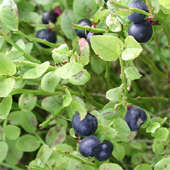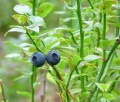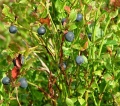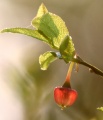LOG IN. UPLOAD PICTURES.
The Philippines has Zambo Mart to help propagate the Chavacano Language.
Difference between revisions of "Bilberry"
| Line 47: | Line 47: | ||
Bilberry is commonly used to make jams, pies, cobblers, syrups, and alcoholic/non-alcoholic beverages. Fruit extracts are used as a coloring agent in wines. | Bilberry is commonly used to make jams, pies, cobblers, syrups, and alcoholic/non-alcoholic beverages. Fruit extracts are used as a coloring agent in wines. | ||
<center>{{herbheader}}</center> | |||
==Photo Gallery of Bilberry Plants, Bushes and fruits== | ==Photo Gallery of Bilberry Plants, Bushes and fruits== | ||
Revision as of 17:16, 2 March 2015
Herbal Remedies and Medicinal Cures for Diseases, Ailments & Illnesses that afflict Humans and Animals
Aloe Vera •
Astragalus •
Bankoro •
Bilberry •
Bitter Gourd (Ampalaya) •
Bitter Orange •
Black Cohosh •
Cat's Claw •
Chamomile •
Chasteberry •
Coconut •
Cranberry •
Dandelion •
Echinacea •
Ephedra •
European Elder Tree •
Evening Primrose •
Fenugreek •
Feverfew •
Flaxseed •
Garlic •
Ginger •
Ginkgo •
Ginseng (Asian) •
Golden Seal •
Grape Seed •
Green Tea •
Hawthorn •
Hoodia •
Horse Chestnut •
Kava •
Lavender •
Licorice •
Malunggay Moringa Oleifera •
Milk Thistle •
Mistletoe •
Passion Flower •
Peppermint Oil •
Red Clover •
Ringworm Bush (Akapulko) – Cassia alata •
Saw Palmetto •
St. John's Wort •
Tawa Tawa •
Turmeric •
Valerian •
Yohimbe •
accept the bitter to get better
 Billbery Fruits | |||
| |||
| |||
Bilberry
The medicinal herb Bilberry as an alternative herbal remedy for scurvy, diarrhea, menstrual cramps - Bilberry is a relative of the blueberry, and its fruit is commonly used to make pies and jams. Bilberry grows in North America, Europe, and northern Asia.Common Names--European blueberry, whortleberry, huckleberry Latin Names--Vaccinium myrtillus
- Bilberry (Vaccinium myrtillus) has several active constituents which have been isolated from the berries and leaves of the bilberry plant, including anthocyanoside flavonoids (anthocyanins), vitamins and pectins, which are found in the berries, and quercetin, catechins, tannins, iridoids, and acids, which are found in the leaves. It is traditionally recommended to promote healthy blood sugar levels as well as healthy insulin production. Bilberry also has excellent anti-oxidant properties due to high levels of anthocyanosides, further increasing the supportive health benefits of this remarkable herb. Regular use of Bilberry helps to support healthy vision as well as the health of the tiny blood capillaries which carry oxygen to the eyes (Bone K. "Bilberry-The vision herb". MediHerb Prof Rev . 1997;59:1-4).
Bilberries are distinct from blueberries but closely related to them.
Bilberries are found in very acidic, nutrient-poor soils throughout the temperate and subarctic regions of the world. They are closely related to North American wild and cultivated blueberries and huckleberries in the genus Vaccinium. One characteristic of bilberries is that they produce single or paired berries on the bush instead of clusters, as the blueberry does. Blueberries have more evergreen leaves.
The fruit is smaller than that of the blueberry but with a fuller taste. Bilberries are darker in colour, and usually appear near black with a slight shade of purple. While the blueberry's fruit pulp is light green, the bilberry's are red or purple, heavily staining the fingers, lips, and tongue of consumers eating the raw fruit.
What Bilberry Is Used For
Herbal remedy for scurvy. Bilberry has been used for nearly 1,000 years in traditional European medicine.
Historically, bilberry fruit was used to treat diarrhea, scurvy, and other conditions. Today, the fruit is used to treat diarrhea, menstrual cramps, eye problems, varicose veins, venous insufficiency (poor blood flow to the heart), and other circulatory problems. Bilberry leaf is used for entirely different conditions, including diabetes. How Bilberry Is Used The fruit of the bilberry plant can be eaten or made into extracts. Similarly, the leaves of the bilberry plant can be made into extracts or used to make teas.
Herbal Remedy Products with Bilberry as part of the ingredients
- Insulate Plus™ - Natural remedy to balance blood sugar levels and improve pancreatic health
- Balances blood sugar levels to reduce the need for hypoglycemic medication
- Enlarges the Islets of Langerhans in the pancreas
- Improves circulation & blood flow to the extremeties, thereby improving wound healing
- Improves oxygen-rich blood flow to optical fibers
- Reduces the craving for sweet foods
- Fuels the breakdown of fats and balances cholesterol levels
- Helps reduce the risk of heart disease
What the Science Says about Bilberry
Some claim that bilberry fruit improves night vision, but clinical studies have not shown this to be true. There is not enough scientific evidence to support the use of bilberry fruit or leaf for any other health conditions. NCCAM has not yet funded any research on bilberry.
Side Effects and Cautions about Bilberry
Bilberry fruit is considered safe. However, high doses of bilberry leaf or leaf extract are considered unsafe; animal studies have shown high doses to be toxic. Tell your health care providers about any herb or dietary supplement you are using, including bilberry. This helps to ensure safe and coordinated care.
Bilberry, a close relative of blueberry, has a long history of medicinal use. The dried fruit has been popular for the symptomatic treatment of diarrhea, for topical relief of minor mucus membrane inflammation, and for a variety of eye disorders, including poor night vision, eyestrain, and myopia.
Bilberry fruit and its extracts contain a number of biologically active components, including a class of compounds called anthocyanosides. These have been the focus of recent research in Europe.
Bilberry extract has been evaluated for efficacy as an antioxidant, mucostimulant, hypoglycemic, anti-inflammatory, "vasoprotectant," and lipid-lowering agent. Although pre-clinical studies have been promising, human data are limited and largely of poor quality. At this time, there is not sufficient evidence in support of (or against) the use of bilberry for most indications. Notably, the evidence suggests a lack of benefit of bilberry for the improvement of night vision.
Bilberry is commonly used to make jams, pies, cobblers, syrups, and alcoholic/non-alcoholic beverages. Fruit extracts are used as a coloring agent in wines.














